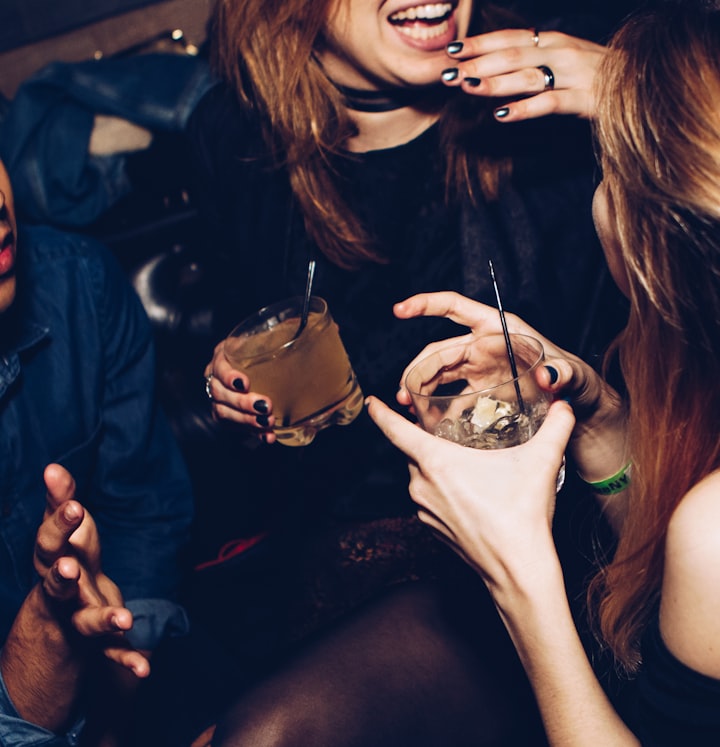Does Alcohol Make You Sexy?
The study supports the idea. And I refuse to follow.

I realize alcohol enjoys a prime spot in our culture. It is like an adhesive, glueing everybody together.
It helps us relax. It helps us relate. It promotes fun, even if initially you are not in the mood for a night out. It is also a form of escapism for many. We distract ourselves with this substance to get away from everyday problems, worries, and responsibilities as well.
I used to drink alcohol on any occasion. Any social gathering. A night alone. As a company to a good movie, any movie. As a side dish to the main course, like chips, obviously.
After not only did my physical health start to deteriorate, my level of happiness sunk very low as well.
My evening glass of wine and I decided to part ways. I have cleared my life of alcoholic-infused beverages altogether.
It has been two years since I have given them up. Now I have an occasional glass of champagne on New Year's Eve, but no more succumbing to my bad habits of boosting my mood with alcohol.
I don’t like the taste anymore.
I don’t like the false narrative behind the reason to consume it. I no longer need it to have fun.
I dread the day after. It is just a day wasted. So was I.
With alcohol being glamorized, it is not simple to wake up from the mesmerization of its popularization. What makes up the recipe behind the attractive allure of intoxicating beverages?
According to a recent study released by the RAND corporation and supported by the National Institute of Alcohol Abuse and Alcoholism, drinking has soared during the pandemic.
People's depression increases, anxiety increases, [and] alcohol use is often a way to cope with these feelings. But depression and anxiety are also the outcomes of drinking; it's this feedback loop where it just exacerbates the problem that it's trying to address.
- Michael Pollard, lead author of the study
When it comes to physical consequences of alcohol consumption, we can enumerate many: depression, memory loss, weakened immune system, high blood pressure, heart problems, liver problems, abnormal cholesterol, fatigue, and high blood sugar level. We can go on and on endlessly.
Not many seem to be aware of how alcohol influences our spirits and vibes. The dynamics between you and your alcohol dependence tend to play out more insidiously.
It boosts your short-lived confidence.
A glamorized image of alcohol consumption throughout movies and TV shows indeed makes our brains correlate drinking with attractiveness.
What is more, a study published in the journal BMJ Open found that people felt most confident and sexy after drinking hard alcohol like vodka, gin, and whiskey.
In fact, researchers have found that drinking spirits did make respondents feel sexier. It also made them act more aggressively, with just under 30% of those studied reporting feelings of aggression. Drinking red wine does make you feel more relaxed, but it also makes you tired.
It tricks you into having fun.
After joining the merry-and-drunk slide, the party seems downhill. However, it may be a slippery slope.
Alcohol is a sedative and a depressant that affects the central nervous system.
At first, it can make you feel less anxious and give you that encouragement in the mood. But that's only a short-term fix that leads to pretty detrimental consequences.
If you rely on alcohol to elevate internal pains and worries, you are numbing the stress and the avalanche of other emotions by burying them instead of facing them. Not to mention, the addiction waits just around the corner.
When you drink alcohol, it raises levels of GABA in the brain. GABA is one of the brain's chemical messengers, or neurotransmitters, that helps you feel relaxed, and it aids in lowering anxiety and stress. High levels of GABA cause your body temperature to drop and your heart rate and blood pressure to come down.
Alcohol also increases levels of dopamine in the brain.
It clouds your judgment.
Alcohol is the most commonly used mind-altering substance in the United States. It reaches your brain in only five minutes and starts to affect you within 10 minutes.
Alcohol also decreases some activity of the prefrontal cortex - the part of the brain that helps you to think clearly and rationally, and it is involved in your decision-making abilities.
When you drink, alcohol makes it harder for the prefrontal cortex to work as it should, disrupting decision-making and rational thought. In this way, alcohol prompts you to act without thinking about your actions.
Alcohol reduces the functions of the behavioural inhibitory centres in the brain, Forbes reports. It also slows down how information is processed in the brain.
When you see, hear, taste, or smell something, your brain processes this information and then tells you how to think or feel. Alcohol interferes with this process, making you insensitive to your feelings and evaluating the potential consequences of your actions.
Alcohol also causes a small rise in noradrenaline - known as the fight-or-flight hormone.
Hangxiety is real.
Are you familiar with that constant state of restlessness, inability to focus, or paranoia creeping over you?
Hangovers and post-drinking recovery aren't always just physical symptoms like headaches or light sensitivity.
The body works to remedy the physical hangover symptoms, and the brain works to remedy the post-drinking chemical imbalances that often cause a spike in anxiety.
Alcohol disrupts your brain functionality, releasing an excess of "feel-good" chemicals like endorphins. The next day, your mood declines.
Research shows that people with alcoholism find it difficult to recover from traumatic events. This is possible because of the effects of alcohol abuse, which can actually change brain activity. Long-term heavy drinkers may be predisposed to developing an anxiety disorder.
You lose awareness of the present moment.
In the beginning, it may seem that alcohol makes you creative, just because you are the life of the party and careless. But it is just an illusion.
In reality, it makes you numb. Numb to the inner chatter and judgment of your inner voice. How about regaining that feeling sans intoxication?
Excessive drinking disconnects you from who you are. The line between how you privately carry yourself and what your circle of friends expects you to be may get fuzzy. If you seek to drink alcohol, you run away from the most authentic version of yourself. It is like you cannot stand living in your sober mind.
Since alcohol is said to make your face more attractive. Did I lose my sexy side because I have denied my ritual consumption of Jack? I refuse to believe so.
Alcohol makes me numb to the sensations within. And I have started to quite fancy myself. No alcoholic boosters needed. People may label me a weirdo, but I refuse to blend in with another glass, only to have the same kind of fun everyone seems to experience.
It makes you care less.
Care less about your appearance. Not in the way: I don't care if they like me. But in the way that you lack the effort to take care of your skin and hygiene.
Alcohol makes you care less about any responsibilities. It seems to infuse you with that cool state.
However, it becomes just one of many masks of avoidance. When you give up responsibility for your life, you give away your authority. And your power lies in remaining aware of your responses to whatever circumstances life presents you with.
The one good thing about alcohol?
It makes you uncover your deepest desires. For me, it was attention. I became loud, striving to be seen and validated.
Once you know what is it that you go after, you can work on providing it without external influence. Instead, find it within with mindfulness, self-care, and trust in your abilities.
Confidence is silent. Insecurities are loud.
I am not advising you to quit cold turkey. Nonetheless, if it seems like a challenging concept to wrap your head around, meditate on your alcohol intake. Try limiting or eliminating it for 30 days. After that period, do not jump back right where you left off, but weigh the pros and cons of how you feel.
How is your stamina?
How is your creativity?
How is your mindfulness practice going?
How is your focus?
And yes. Your circle of friends will diminish but gain in quality.
You will no longer feel compelled to spend time with people just for the sake of killing time. Once you raise your awareness and vibration (alcohol disrupts this superpower), you get to attract the right tribe.
You no longer need to spend time with people to complain or provide you with a good time. You are having a damn good time on your own, so any company is a plus, not a must.
Thank you for reading
- Kate
About the Creator
Katarzyna Portka
Mindset coach. Writer. Reader. Coffee enthusiast. Tolkien’s fan living in Harry Potter’s world.






Comments
There are no comments for this story
Be the first to respond and start the conversation.